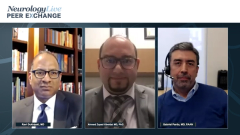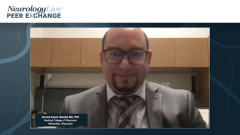
Use of Generic DMTs in Clinical Practice in RRMS
Ahmed Zayed Obeidat MD, PhD; Ravi Dukkipati, MD; and Gabriel Pardo, MD, FAAN, comment on the use of generic DMTs in the treatment of RRMS, highlighting efficacy and safety data as well as level of equivalence to brand name treatments.
Episodes in this series

Ahmed Zayed Obeidat MD, PhD: Now we are going to go back to generics and talk about their use in clinical practice. I’m going to ask some direct questions here, and one is, how often do you start a patient on a generic DMT [disease-modifying therapy]? And that’s a question for either of you, whoever wants to answer it.
Ravi Dukkipati, MD: I would say I don’t start patients on generics, voluntarily, that is. It’s not a part of my practice paradigm, where I initiate a generic.
Ahmed Zayed Obeidat MD, PhD: And same for you, Dr Pardo?
Gabriel Pardo, MD, FAAN: Same here, yes.
Ahmed Zayed Obeidat MD, PhD: Same for me.
Gabriel Pardo, MD, FAAN: Ionly use generics if forced by circumstances to do so. But it’s not front of mind to do so.
Ahmed Zayed Obeidat MD, PhD: This is important. I think it’s good to stop and reflect a bit and think about this because we’re not starting patients on generics just because we don’t want to start them. We’re not starting them on generics because there are some problems, there are things in our mind that make us think about why these medications are underutilized. They’re available, but they’re underutilized because there are some concerns, not only from us, but maybe from patients also. I see it often where they are switched to a generic because their insurance company switched them. Then they call the clinic or send a message that they’re worried. They don’t want to take this new medicine because they want the brand name medication. Sometimes I explain that generics are a copy of it, so it should work. If you’re not having issues with access, you’re not having issues with cost, it’s OK to stay on it. I want them to be on medication, I don’t want them to stay off of anything.
There is a paper that recently was looking at consensus and follow-on treatments for MS [multiple sclerosis], and it was by a group of MS specialists from the United States and from outside of the US. This paper identified several problems with perceptions of generics, but also because there are no ongoing studies with the disease itself, MS. There are no real-world data. There are no switch studies. If I have a patient on a brand name fumarate and they switch to generic fumarate, there are no studies to tell me if it is going to work. Am I going to have a problem? Is there going to be different safety, different efficacy? Am I going to see a change in lymphocyte count or biomarkers, anything of that nature?
But also, is there continued pharmacovigilance from those manufacturers of the generic? If someone is developing a serious adverse effect on a generic, are we collecting these data? Are we reporting this, are we looking at it? I think these factors in addition to not much reduction in the cost make people not as enthusiastic to adopt generics when they come. There are these problems we are seeing, these problems that are probably barriers for why we’re not really using them as first-line treatment. I want to take this opportunity to ask you, do we have studies looking at generics or biosimilars in MS, not only in healthy controls? Do we have any?
Gabriel Pardo, MD, FAAN: None that I’m aware of. Again, all the studies are pertaining to PK [pharmacokinetic] information, and that is it. Then as you mentioned, there is the perception we have and the perception patients have. We want to believe, and probably that’s the truth, that especially for small molecules, replicating a chemical compound is easy enough that we are going to have the same product. We should believe that. But they are not required to have everything the same. Excipients can be different, and patients might have tolerability issues with a coloring compound or to the excipient itself.
We do see, for example, it was our experience—is it a nocebo effect in patients, I do not know—but we did hear when we started switching patients from the dimethyl fumarate to the generic version of it, patients started calling us complaining of increased GI [gastrointestinal] adverse effects, a significant number of our patients. Again, is it a nocebo effect that patients feel, “Oh my God, this is something different, I do not want to be on this,” or is it true? I do not know. But that was a reality we had to face at the time.
Ahmed Zayed Obeidat MD, PhD: Yes, same for us. Dr Dukkipati, do you see the same thing in your practice?
Ravi Dukkipati, MD: Yes. How much of this is psychological or a placebo component, I don’t know. But what we’re seeing in real day-to-day practice is exactly what Dr Pardo and you have mentioned, and that is it’s very disruptive for patients to go from month to month. When these generics, the small molecules, are interchangeable, the pharmacy is free to substitute one for another. And depending on who they’ve negotiated with, the pills are different, the capsules are different colors. They have different compounds, the delivery, that is. And tolerability can be variable. While these drugs have demonstrated bioequivalence, we’re taking a leap of faith in a sense.
Ahmed Zayed Obeidat MD, PhD: To your point, the only thing demonstrated is that their bioavailability in the blood is the same, in people who don’t have the disease. This is where this consensus group or this group that met recently, their main recommendation is to have more transparency to the public, including us as doctors and to patients, on these generics. How are they equivalent, how they are copies of those, and what are the data behind it? What are the data that showed it, so we can develop our confidence?
I tell my patients when they ask me about switching to a generic, I say yes, that’s fine. They should be the same. To me, they’re the same until proven otherwise, and means often proven otherwise clinically in 1 patient, or proven otherwise in clinical studies. We need to call for more studies to look into generics in the disease state, this can be done with real-world data, it doesn’t have to be clinical trials, but real-world data to look at that.
Gabriel Pardo, MD, FAAN: The additional component to that, Dr Obeidat, would be that if we were really creating appropriate and significant savings to the system and to the patients, it would be more palatable. But we are not. That is the disturbing component to all of this. The cost of these medications remains the same, and the out-of-pocket cost to the patient is going up. So, putting all that together, we cannot be enthusiastic about it.
Ravi Dukkipati, MD: No.
Ahmed Zayed Obeidat MD, PhD: That’s right, yes. Seeing even the data that led to the approval of the follow-up medications and everything is important. And to the patient sometimes it’s cost escalation. Patients have more cost sometimes in the end.
Transcript edited for clarity
Newsletter
Keep your finger on the pulse of neurology—subscribe to NeurologyLive for expert interviews, new data, and breakthrough treatment updates.














